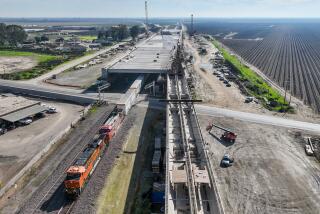U.S. auditor says funding for Iraqi rebuilding should cease
- Share via
WASHINGTON — Rising production and skyrocketing prices could more than double the Iraqi government’s expected bonanza in oil revenue this year, leading a top U.S. government auditor to call for an end to American funding of Iraqi reconstruction projects.
The Iraqi government had projected 2008 oil revenue of about $35 billion. But a U.S. report to be issued today by the special inspector general for Iraqi reconstruction will say that oil production in the second quarter of the year hit 2.43 million barrels per day, a post-invasion record.
“With oil now hovering around $125 per barrel -- about five times what it was five years ago -- and Iraq’s oil production at record levels, SIGIR estimates that oil revenues for 2008 could exceed $70 billion,” the report states.
The report by the independent audit agency provides potent backing to critics of the Bush administration in what has become a highly charged political issue. Democratic leaders in Congress are pushing the administration to pressure the Iraqi government to fund its own infrastructure projects through rising oil revenue.
In the most recent war funding bill, lawmakers inserted a requirement that all U.S. funding for projects not related to Iraqi security be matched on a dollar-for-dollar basis by Iraqi government spending.
In response, administration officials have urged patience, noting that Iraqi spending for reconstruction has risen sharply and that the American contribution would gradually diminish.
U.S. funding for Iraqi reconstruction has declined over the last four years. In 2008, the new report projects, the $4.2 billion appropriated by Congress for rebuilding will be less than a third of the $13.1 billion that Iraq itself is expected to spend.
But Stuart W. Bowen Jr., the special inspector general, said in an interview that he favored ending U.S. participation entirely, because the Iraqi oil windfall plus unspent funds from earlier budgets are more than adequate to meet the country’s reconstruction needs.
Bowen said that Barham Salih, the deputy Iraqi prime minister in charge of reconstruction, earlier this month had insisted that Iraq did not need additional foreign funding for reconstruction.
“They certainly have the resources to invest in their infrastructure program,” Bowen said. “I think we ought to just take them at their word on that and focus on helping Iraq carry out its own program funded by its own money.”
According to the report, cumulative Iraqi funding for reconstruction caught up with total U.S. spending within the last three months. Each government has appropriated more than $50 billion since 2003.
The audit emphasizes, however, that the Iraqi government continues to struggle to spend the money it is accumulating. Because of government inexperience and bureaucratic bottlenecks, the Iraqi government had spent only 2.7% of its capital budget by March 2008, the latest figures available.
The report notes that the Iraqi government has improved in this regard, spending 63% of its capital budget last year, compared with 22% in 2006. But Bowen said the U.S. should focus its reconstruction efforts on helping the Iraqis improve those rates.
“A lot of that money is going to be left unspent,” Bowen said.
At the start of July, Iraq had already brought in $33.1 billion in 2008 oil revenue, according to the report. Production levels were up 2% over the first quarter of the year and 16% over last year. The audit notes that production is approaching prewar levels, which averaged 2.58 million barrels per day from 1998 through 2002.
A portion of the increase is credited to a drop in pipeline attacks. The report estimates that an additional 350,000 to 500,000 barrels every month now make it to market because of “pipeline exclusion zones,” a system of berms, fences and guardhouses built around major pipelines in the country.
Bowen said that corruption remained a problem within Iraq, however, and that he was concerned the huge windfall in oil funds could end up in the wrong hands. Iraq’s own government auditing agency, the Board of Supreme Audit, has repeatedly found corruption at many of Iraq’s ministries.
“Given that was going on earlier this year and that we have this massive windfall occurring, inevitably there has to be concerns about corruption with regards to those funds,” Bowen said.
As Iraq’s oil industry has regained its footing, the government has attempted to attract private foreign investment to upgrade its decaying infrastructure. Last month, it announced that it was opening bidding to 35 foreign oil companies for long-term contracts on six of its key fields in hopes of increasing output to 4.5 million barrels a day.
The move followed an earlier decision to offer separate, short-term contracts to five U.S. and European companies -- ExxonMobil, Chevron, Total, Shell and BP -- on a noncompetitive basis.
Those contracts have been delayed, however, after Democratic criticism of possible State Department involvement in developing the contracting process.
--
More to Read
Sign up for Essential California
The most important California stories and recommendations in your inbox every morning.
You may occasionally receive promotional content from the Los Angeles Times.






